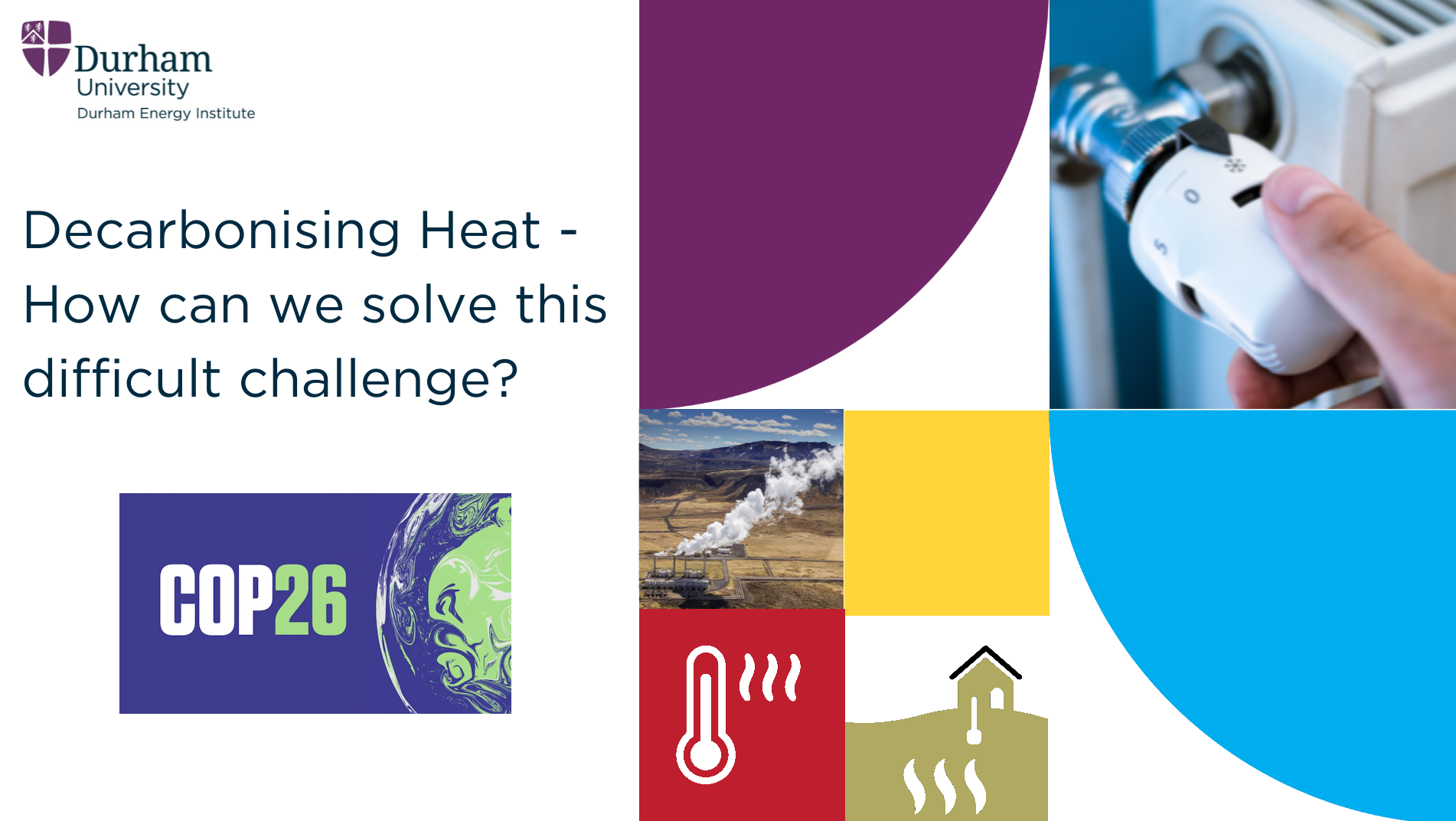DEI @ COP26 highlighting the importance of focusing on Decarbonising Heating

DEI and its partners have launched a campaign to be exhibited at COP26 Green Zone in Glasgow on November 11th to highlight the importance of innovations for decarbonising heat to meet the goals of the conference.
At COP26 and the run-up to the global meeting in Glasgow, Durham Energy Institute and its partners will be highlighting the importance of implementing innovations to decarbonise heat.
Although significant strides have been made to cut carbon emissions, global targets will not be achieved unless we are able to tackle heating and cooling.
As part of the COP26 campaign a number of short films have been produced by researchers and practitioners across the UK and internationally to highlight the Heat challenge in different contexts and the innovations being developed to address this.
There will also be an exhibition at COP26 itself in the Green Zone on November 11th – the official day focused on Cities, Regions and Built Environment - as part of the COP26 Universities network activities.
Watch the introductory film to the campaign by DEI Director Professor Jon Gluyas.
Why is Decarbonisation of Heating and Cooling so important?
In 2019 the UK Government amended the Climate Change Act to commit the UK to achieving net zero by 2050 and in April 2021 the UK Government announced it would set in law the world’s most ambitious climate change target yet, cutting emissions by 78% by 2035 compared to 1990 levels. However the Climate Change Committee has said that the UK is currently not on track to meet even a 57% reduction by 2030.
If we are to eliminate carbon emissions by 2050 it is paramount that we tackle the continued reliance on fossil fuels for heating and cooling.
The International Energy Agency (IEA) have found that the highest energy consumptions of OECD countries are for heat, which accounts for 37% of energy use, and transport at 32%. Added to this most vehicles are around 25% efficient and the rest is unused heat!
Similarly in the UK, heating accounts for 40% of energy use and is one of the largest contributors to the UK’s carbon emissions, representing 37% of total UK carbon emissions when including industrial processes and 13% of greenhouse gases resulting from home heating using fossil fuels.
In the EU Industrial process heating accounts for 18% of total EU final energy demand. It is more energy than the combined electricity consumption of Spain, Germany, France and the UK!
Why is decarbonising heating and cooling so difficult?
It is clear that the decarbonisation of heat is essential to reaching a climate-resilient future.
However, the scale of the challenge is massive as the decarbonisation of heating and cooling is the most challenging element of achieving net-zero due to a range of factors:
- There is no single ‘cheap’ solution – a range of solutions are required which need to be chosen for the specific context.
- Timescales for the net-zero target - requires a rapid and fundamental change to national infrastructure within 30 years (It took 35 years to switch to central heating.)
- The size of the challenge- 5% of UK homes have low-carbon heating with 85% using natural gas.
- Poor energy efficiency- In 2020 two thirds of UK homes failed to meet long-term energy efficiency targets and 13.4% of household are considered to be in fuel poverty. Low-carbon heat cannot be deployed cost-effectively unless buildings are properly insulated.
- Societal knowledge - 48% of people have no recognition of low-carbon heating options or incentive to change according to the BEIS Public Attitudes Tracker.
We are developing solutions for the decarbonisation challenge
The decarbonisation pathway is challenging and requires a collaborative approach to find innovations which will balance the Energy Trilemma: Security, Affordability and Sustainability.
The decarbonisation of heat in particular is critical to the UK’s and global net zero journey and is the area that has been the most difficult to tackle.
Governments have introduced very promising measures to replace gas boilers with electric equivalents to enable heating from renewable electricity, and tighter energy efficiency measures for homes and buildings. These are crucial for reducing our heating carbon footprint.
In his campaign video Muhammad Faisal Sharif, who works in the Pakistan Government, highlights that Pakistan is aiming to increase the share of renewable energy up to 60% in their overall energy mix by 2030 and is introducing other incentives to promote use of electric appliances for space heating. This is despite Pakistan having one of the lowest per capita carbon footprints.
“The pathway to decarbonisation is more challenging for developing countries… It is time to scale up financing, extend policy and technical support to low income countries. All countries must work together to diminish the challenges on their way to meet a NetZero future - as without collaboration we will not succeed.”
However it is also essential we focus our efforts on direct heat sources such developing low carbon heat networks using geothermal energy to heat homes and recovering waste heat from industrial processes or infrastructure so it can be reused.
This would provide secure, sustainable, and ultra-low carbon heating options and will help ease the increasing demand on electricity grids. It is also significantly more efficient than the use of electric heating which implies energy waste at each stage of the process from energy capture, electricity generation, electricity transmission to the point of use.
Through our work on geothermal heat, waste heat capture and reuse, integrated heating & cooling networks, heat storage and heat from hydrogen DEI and our partners are making major strides towards renewable heat.
Professor Chris McDermott, University of Edinburgh highlights that:
“Heating and cooling are some of the hardest parts of our energy mix to decarbonise and are therefore fundamental to reaching NetZero targets. We are improving efficiency of technologies to generate heat but we are not making the most of excess heat already generated through all kinds of industrial processes. The Geobattery concept provides a joined-up, whole-system approach that creates a circular heat economy, recycling, storing and transporting excess heat in the subsurface to provide local sustainable low-carbon heating and cooling accessible through heat pump technology.”
Watch the Geobattery concept film.
Geothermal and minewater heat
DEI and its partners from the Coal Authority, British Geological Survey, Edinburgh University, North East Local Enterprise Partnership, North West Europe and elsewhere are exploring the potential for geothermal energy and extracting heat from mine water to support heat decarbonisation.
We estimate that geothermal from mine water in the UK could provide heat for our homes for the next 100 years as 25% of the UK’s housing stock lies on top of former coal mines. This could provide low cost energy as well as transforming the communities of previous mining areas, many of which have experienced high levels of deprivation since the closure of the mines.
Dr Charlotte Adams, the manager of mine energy and innovation at the Coal Authority says in her film:
“It has got huge potential, it is accessible and the technology exists. We have already got 80 sites where the water comes to the surface and that produces around 100 megawatts of heat that is currently not being used.”
Project examples include:
- Geothermal Energy from Mines and Solar-Geothermal heat (GEMS) project led by Durham University using interdisciplinary expertise to assess and address the technical, social, and financial challenges of exploiting disused, flooded coal mines as a source for long-term sustainable heat for homes and businesses in the UK.
- Roll-out of Deep Geothermal Energy in North West Europe (DGE-ROLLOUT) led by Geological Survey of NRW facilitates the use of natural and stored heat from the deep underground to reduce CO2 emissions.
- GeoBattery Concept developed by researchers at the University of Edinburgh and ECUS ltd. A circular heat network utilising legacy mineworkings in the subsurface as a storage and transport medium to ensure vertical ground source heat pumps are truly sustainable, while at the same time reducing the amount of excess heat being wasted to the atmosphere.
Capturing and reducing waste heat
Other collaborations are looking at solutions to use heat that is often wasted such as geothermal heat from the ground, or heat generated by data centres, supermarkets, underground railways, electrical transfer solutions and heavy industries. This includes the work of the Heating and Cooling team at London South Bank University (LSBU) and the DEI-led national Network for Heating and Cooling Research to Enable a Net-Zero Carbon Future.
Projects examples include:
- DEcarbonisation of Low TemperAture Process Heat Industry, DELTA PHI. A project led by Loughborough University with Durham and London South Bank Universities which is developing an approach to use heat more effectively within the industrial process, and/or export heat to meet heat demands in the neighbouring area allowing significant reductions in greenhouse gas emissions and potentially providing an additional revenue source.
- Green Smart Community Integrated Energy Systems, GreenSCIES. Led by LSBU is an innovative approach for delivering a detailed design for a smart energy system that integrates new low carbon energy technologies across heat, power and mobility across the UK;
- Zero-Carbon Emission Integrated Cooling, Heating and Power (ICHP) Networks. Led by Durham University this project aims to explore the potential to supply cost-effective heating and cooling to domestic, commercial and industrial end-users via integrated zero-carbon emission cooling, heating and power (ICHP) networks using hydrogen.
Follow the campiagn on Twitter, LinkedIn and Facebook using #COP26DecarbHeat


/prod01/prodbucket01/media/durham-university/research-/research-institutes/durham-energy-institute/landscapes-cityscapes-montages-etc/Walney-sunset-2000X800.jpg)

/prod01/prodbucket01/media/durham-university/departments-/archaeology/WNormandy.jpg)
/prod01/prodbucket01/media/durham-university/research-/research-institutes/durham-energy-institute/technologies/heat--cooling/Heat.png)
/prod01/prodbucket01/media/durham-university/research-/research-institutes/durham-energy-institute/technologies/solar--pv/Man-making-bricks-solar-charging-phone-c-Sudip-Maiti.jpg)
/prod01/prodbucket01/media/durham-university/research-/research-institutes/durham-energy-institute/climate-change-cop--sdg-goals/COP26_logo_landscape_blue_RGB-small.png)